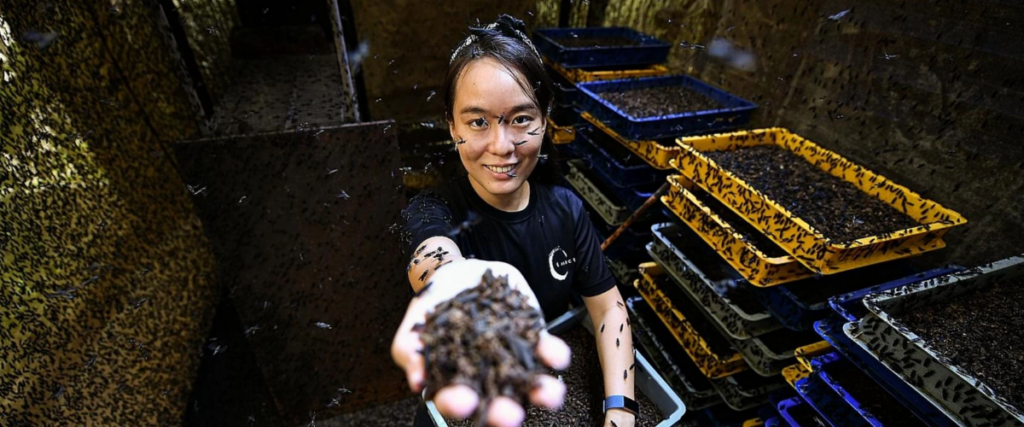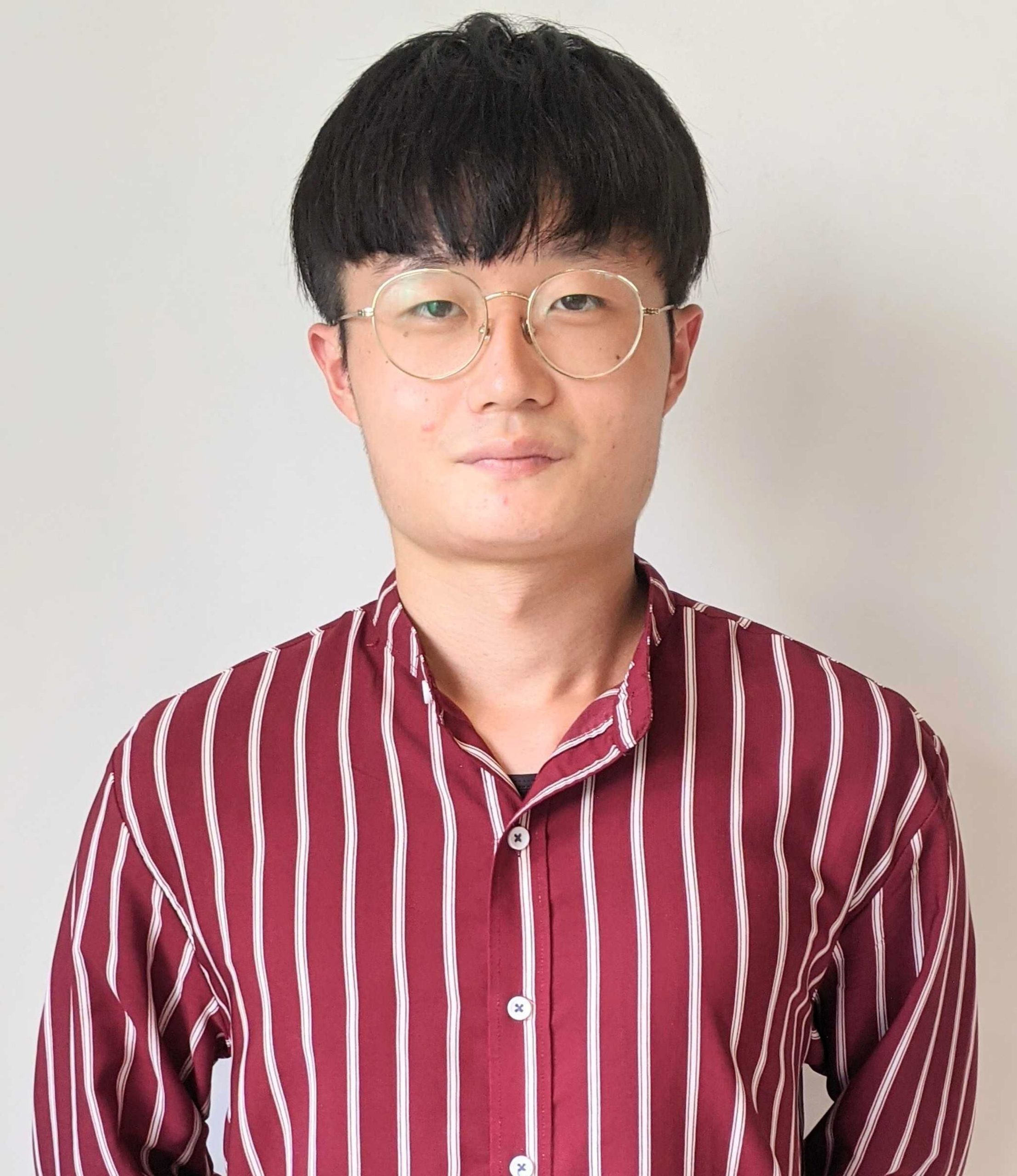With a vision to expand the insect farming industry in Singapore, Insectta rears black soldier flies for waste valorisation and biomaterial production. Read on to learn more about how Insectta is promoting circular economies and farming the biomaterials of a sustainable future.
Insect farming is a relatively new concept for most. Instead of dealing with livestock, these companies breed, rear, and harvest insects for animal feed, pharmaceuticals, and cosmetic uses.
With the aim of changing the stereotypical conception of insect farming in Singapore and the world, Insectta rears the black soldier fly to produce useful biomaterials for the manufacturing of daily products- from facial skin masks to semiconductors. We spoke to Kai-Ning Chua, the Co-founder and Chief Marketing Officer of Insectta for her insights on the insect farming industry, and how businesses can work to promote a circular economy.
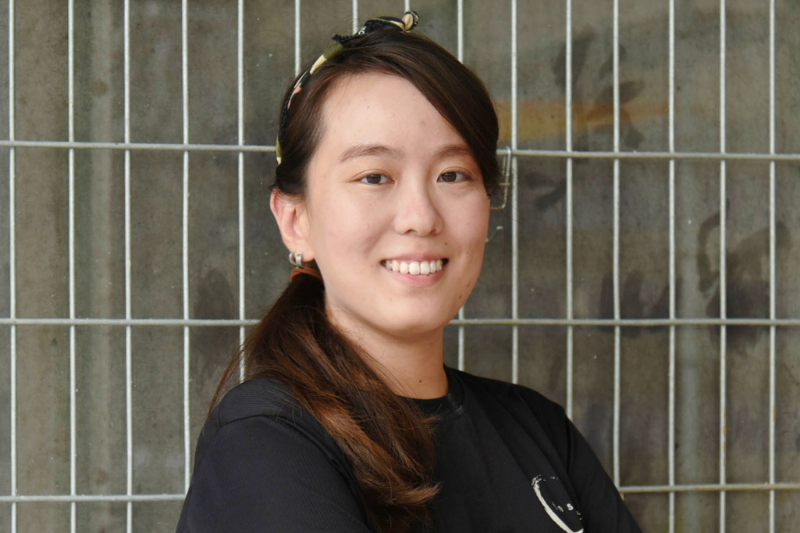
Can you tell us more about Insectta?
Insectta is Singapore’s first black soldier fly BioTech company. A few years ago, no one in Singapore had heard of the black soldier fly. We specialise in technology that extracts high-value biomaterials from the black soldier fly. When I say “biomaterials,” it is simply a catch-all term for useful chemicals that have applications in industries, such as bioelectronics, pharmaceuticals, as well as personal wellness.
The black soldier fly is relatively a newcomer to the AgTech industry. Within this short time, people have realised the potential of the black soldier fly resolving the problem of food waste- it can eat up to four times of its body weight of food waste a day. Today, people are looking to use the black soldier fly for the production of animal feed, additives, as well as fertilisers.
Here at Insectta, we do something different. Our goal is to expand the value of the black soldier fly- to expand its application in various industries beyond just agriculture.
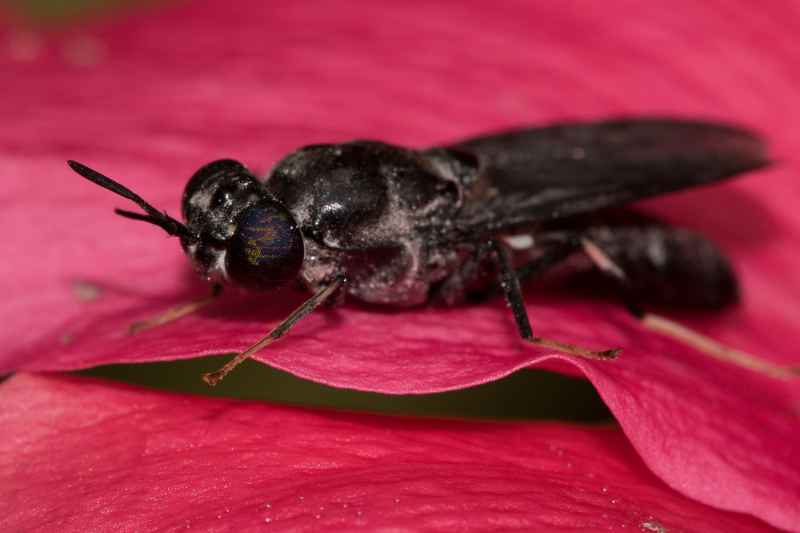
What inspired you to be involved in such a unique business?
I think what drives all of us is our passion for waste valorisation. Waste valorisation is a relatively new concept in the whole waste processing industry. The ideal waste valorisation is that waste is not a waste, but a resource.
All of us at Insectta have a love for the environment. We wouldn’t be doing this if we didn’t care for the environment and the circular economy.
And when we say circular economy, it comprises two words. “Circular” meaning sustainable and “economy” meaning dollars and cents. We want to produce a product that has monetary value.
How does Insectta’s production process for the biomaterials work?
We feel a niche inside the black soldier fly farming industry. We take the byproducts of the black soldier fly and transform that into biomaterials.
Our biomaterial extraction process is patent pending. As far as we know, we are the first in the world to do this. The extraction process involves the use of both biological and chemical methods. Although I cannot reveal too much about our process, I can tell you that it is a lot greener than conventional methods of extracting biomaterials like chitosan and melanin.
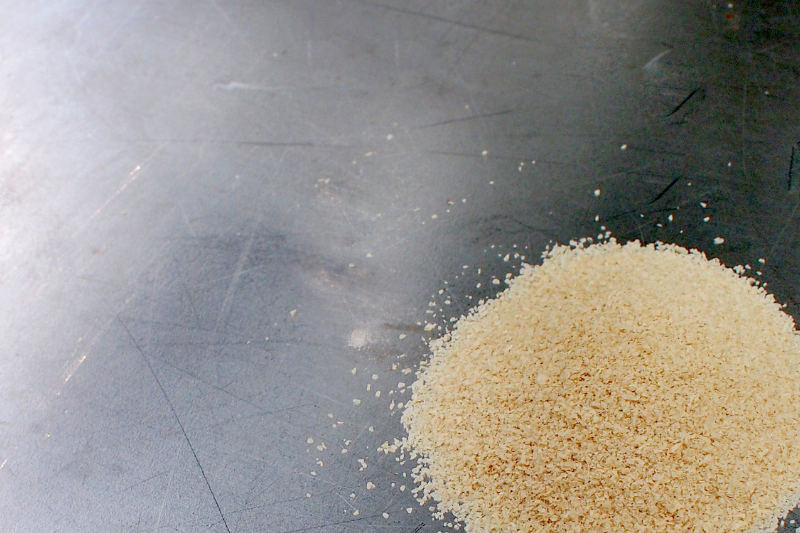
Insectta’s chitosan extracted from the black soldier fly
Can Insectta’s biomaterial products be used for the same purposes as conventional chitosan and melanin?
People often ask about the quality of our biomaterials from the black soldier fly. The answer is that they work in the same way as the conventional ones. This is not only based on lab tests. Our chitosan has actually progressed to the point where we have commercial value as well. We have paired up with several cosmetic and pharmaceutical companies in Singapore and we supply our chitosan to them. They are already integrating our biomaterial with their products.
Regarding melanin, we are similarly done with the process of extracting it. Melanin has a lot of properties- conducts electricity, helps one treat cancers, and facilitates bone healing. The only downside of melanin is its expensive cost – that is limiting its entry into the consumer market.
We have discovered a way to extract melanin from the black soldier fly. We are the first in the world to be able to do this. Our goal is to eventually bring down the cost of melanin, so it can serve its various purposes.
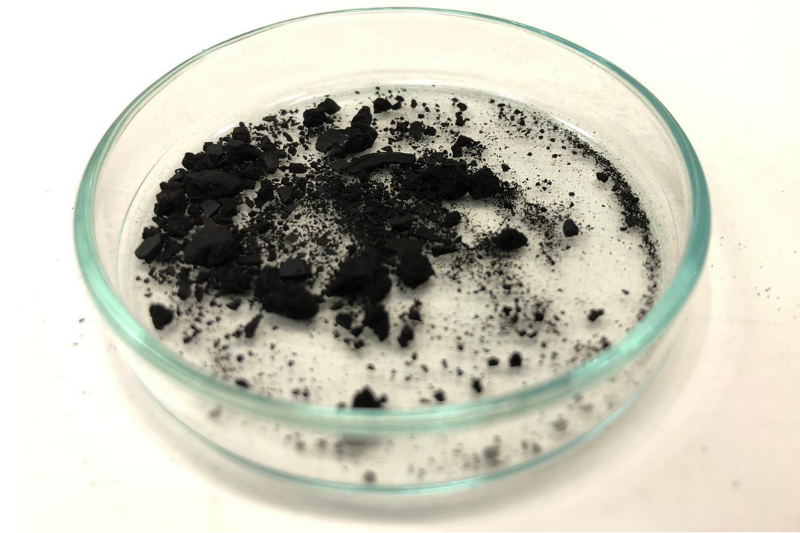
Insectta’s melanin extracted from the black soldier fly
There are some who may doubt the health & safety of general food waste consumption, especially in relation to biomaterial products being repurposed for animal feed. How do you ensure quality control?
Quality control is very important, especially when you are making something that goes into people’s body or they would put on their faces. This is where we need to bring in the concepts of traceability and regulations.
Everything is quite heavily regulated in Singapore. In fact, it took us a very long time to set up the company, not because we did not know how to rear the black soldier fly, but because we had to assure the government that what we do is properly done.
We feed our black soldier fly on what is called pre-consumer food waste. In a sense, it is a clean food waste. What many people tend not to know is that pre-consumer food waste accounts for 90% of food waste in Singapore.
Why we choose pre-consumer food waste is because it is homogenous and traceable. We know who has touched it and we know where it has come from.
So overall, our quality control is assured. The food waste we are bringing are traceable, everything is regulated under the law, our processes are transparent, and we have tested our products on the market.
Who usually purchases your products/who are your target buyers?
We want to target manufacturers, especially with our products that are meant to be sustainable. This is mostly for the chitosan. For melanin, we are looking for manufacturers who target melanin’s unique capabilities.
But in the long term, we look at one or two generations down the road. We obviously want to target all individuals on the street- want them to be open with the fact that our products come from insects.
Most people today tend to get creeped out by the fact that we use insects to make products, but I find this quite ironic. In a sense, consumers commonly use insects on a daily basis. For instance, we eat and even wash ourselves with honey, which is practically insect’s vomit.
So first, we want to prove to our manufacturers that our biomaterials function the same as traditional materials, and also show them the sustainability aspects of our products. Going down the road, we want to appeal to the mainstream consumer market. We are achieving this through education programmes that could change people’s conception of insect-based products- creating a better market for the future.
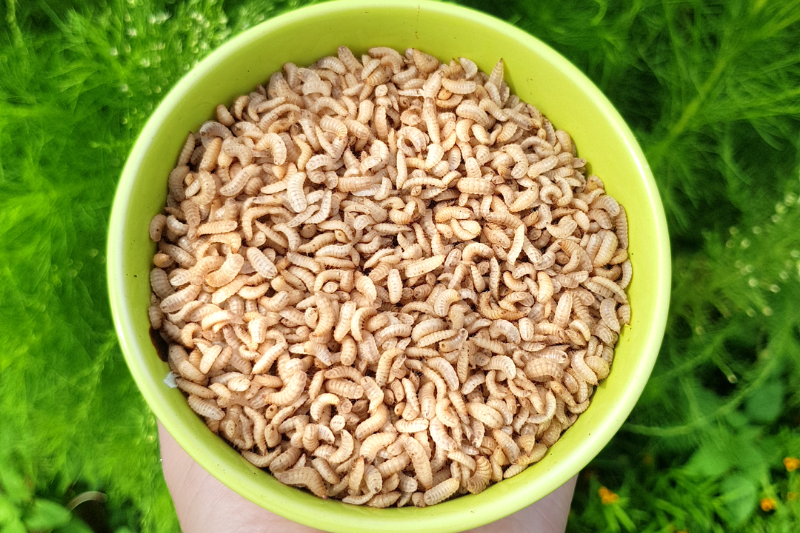
Would you say changing people’s conception of insect-based products is another vision of Insectta?
Most definitely. When you create a company that belongs to a sunrise industry- to say something that is not mainstream- a big challenge is to change consumer mindset. If your market is not ready to accept your products, you have to set back even when your technology is ready.
We can see similar efforts being made in other industries, such as alternative protein production. 10 years ago, people even thought that was weird. I believe it is the result of those relevant companies convincing the consumer market. It is a very long walk currently in progress at Insectta.
Today, more people are looking for sustainable solutions. What do you see for the future of insect farming with regards to this phenomenon?
I think it will take a while for the consumers to accept the idea of insect farming. I don’t think it’s gonna happen within our generation. The children of our generation would be the mindset changers in the future.
As a society, we have a very strange relationship with insects. In Southeast Asia, we have been eating them for thousands of years. But for some reason, the current generation has a very warped idea of what is healthy and what is natural. For instance, people would rather eat a conventional burger than an insect burger, despite the fact that the conventional burger is unnatural while the insect burger is natural. This shows the extent of how society has been conditioned on what’s right and wrong.
So if we inculcate the importance of sustainability and the impact of meat farming to the next generation, and give them more sustainable options, I do believe that they will find insect farming appealing whether it is for consumption or production of biomaterials.
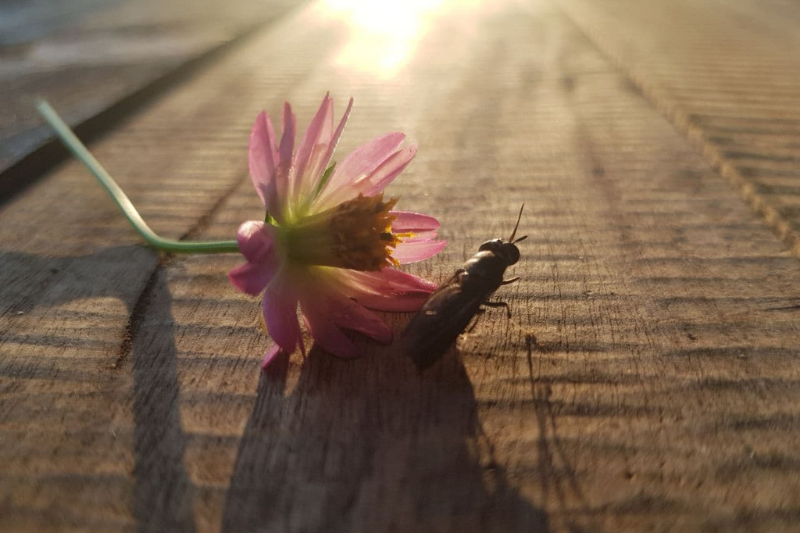
Do you have any plans to farm other insects for practical use?
We will definitely look into it more in time, but not in the near future. We are still unlocking the potential of black soldier fly.
What makes the black soldier fly differ from other insects is its ability to eat food waste. Not all insects can do that. For instance, commonly farmed insects like crickets, silkworms, and mealworms don’t eat food waste- they have to be fed. In this sense, they are not exactly circular.
Farming black soldier flies is really circular, because the species thrives on food waste and it can transform into a useful product afterwards.
What’s next for Insectta?
We have definitely nailed down our biomaterial extraction process. This is what we have been working on in the last one and a half years. We are facing increasing demands for our chitosan and melanin. So our immediate goal is to scale up- we want to create a platform where we can produce our biomaterials on a larger scale. At the moment, our rate of production cannot keep up with demands coming from all over the world.
Insectta offers a wide range of workshops, tours, and outreach sessions for people to know more about the insect farming industry. We have organised these programmes for various chemical manufacturers and other relevant firms in the past. The goal of the programmes is not simply to let people know more about Insectta, but to teach the importance of sustainability and the presence of sustainable options.
Featured banner image credit: LIM YAOHUI at The Straits Times
Related Articles
Insect Farming: Farming Flies to Save our Planet
